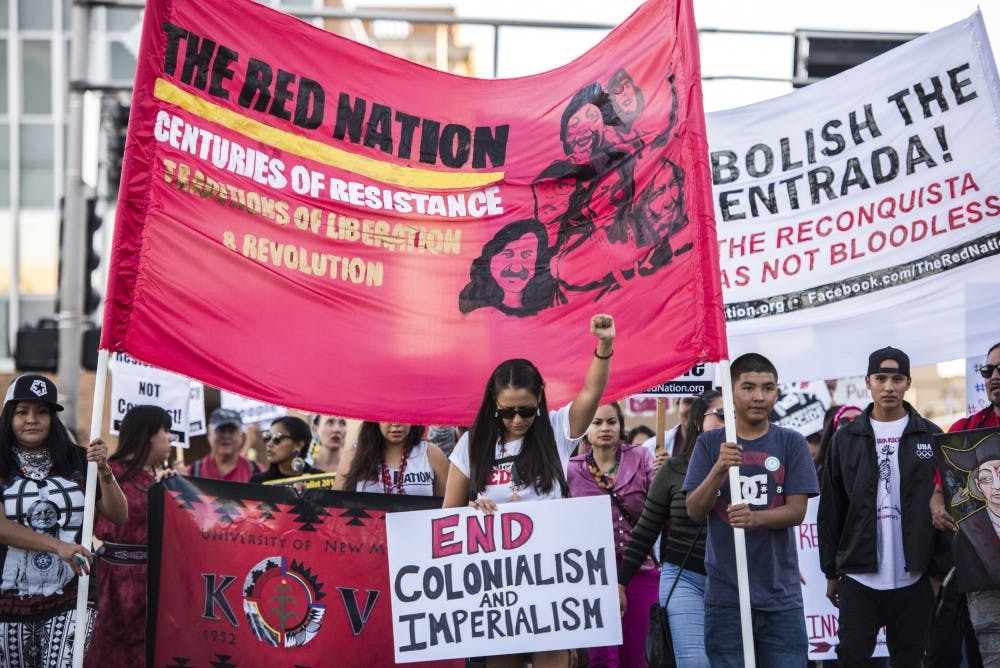What began in 1952 as a social club for Native American students at UNM quickly evolved into one of the most politically active groups in New Mexico by the time the Civil Rights Movement was at its peak in the ‘60s.
KIVA Club, a student organization meant to encourage community involvement in Native American issues, is steeped in a history of consistent activism. To many students, KIVA Club might best be known today for its ongoing campaign to abolish the University’s official seal — which it has called offensive — but this effort is just the latest in a series of social movements spawned by the group’s members.
According to current KIVA Club President Demetrius Johnson, and former President Leona Morgan, KIVA Club played a vital role in the establishment of the Native American Studies Department at UNM in 1998, and again in 2004 when the program was approved as a major within University Studies.
But by no means are KIVA Club’s activist efforts confined to campus, Johnson said, recalling his initial experience as president.
Johnson assumed the role of club president last year, in the wake of the consequential Gold King Mine spill, which turned parts of the Animas River in northern New Mexico yellow for months, adversely affecting the lives of thousands.
“When that happened a lot of people looked towards KIVA Club,” Johnson said, discussing the expectations of the club and its president. “A lot of former presidents and past members were looking towards me like, ‘Do you have a plan? Is KIVA Club going to do anything about this issue?’”
The club’s president is also expected to be familiar with the “rich and powerful history” of KIVA Club, he said, making reference to a well-known anthropologist, the late Alfonso Ortiz, as well as Larry Casuse, who served as club president during the Civil Rights era.
“Having those people as alumni is very powerful,” Johnson said, relaying an account of the “immortilization” of Casuse, who was killed after taking hostage the controversial, liquor store-owning mayor of Gallup in 1972. Casuse was 19 at the time of his death.
“KIVA Club always looks towards Larry,” he said. “Having the spirit of Larry Casuse, which is what we always say, is fighting for your people and fighting for your community and fighting for indigenous rights. That’s a part of what KIVA Club is.”
Born out of a desire for a space in which Native American students could embrace their indigenous heritage, the club’s legacy also includes introducing the first pow-wow to the state of New Mexico, which was held in the backyard of founding members, he said.
Today, KIVA Club is taking a turn back to the “Casuse Days,” Johnson said.
“We’re all educated natives now, and we realize,” he said, “especially living in the world today, that a lot of things need to be addressed.”
Get content from The Daily Lobo delivered to your inbox
Johnson listed cultural appropriation on campus and in pop culture as some of these issues.
The names of residence halls, distasteful imagery in Zimmerman Library, misplaced artifacts in the Anthropology building, and the University seal, are all issues the group aims to address, he said.
“Now more than ever, KIVA Club is needed,” Johnson said. “When native rights are fulfilled, honored and respected, that will be the foundation for (other marginalized groups) to make their case also.”
For a brief time in the ‘90s, KIVA Club’s name was changed to “Continuing Indian Religion Culture, Language and Education (CIRCLE) Society of American Indians” for various reasons, former president Leona Morgan said.
Aside from being considered “too Diné-centric” (the word ‘kiva’ comes from a Pueblo language), she said KIVA Club was under consistent pressure from the administration at UNM to depoliticize group activities.
Because of this, the club nearly “lost its way,” Morgan said.
“We didn’t understand the role of CIRCLE Society... but we knew KIVA Club had a strong history in activism and it was very politically motivated, and we wanted to go back to that original foundation, back to our roots,” Morgan said.
Hence, the name was reverted to KIVA Club, and the group’s effort to live up to its politically active history was revitalized, she said.
“(KIVA Club) wasn’t just something on campus, it was actually addressing how to improve the lives of indigenous people, everywhere,” Morgan said, “It wasn’t about ego, it wasn’t about the individual — it was about the future of all indigenous people.”
Johnny Vizcaino is a news reporter for the Daily Lobo. He can be reached at news@dailylobo.com or @thedailyjohnnyv.






